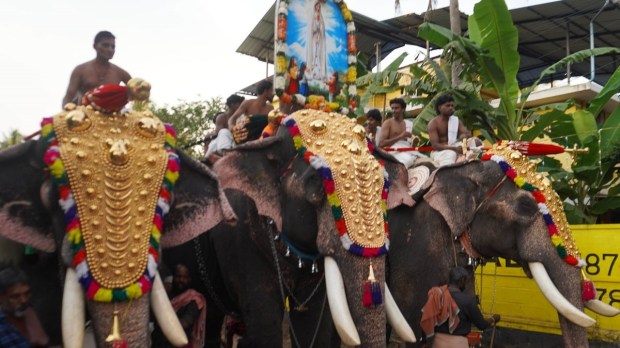Lenten Campaign 2025
This content is free of charge, as are all our articles.
Support us with a donation that is tax-deductible and enable us to continue to reach millions of readers.
Annual parish feasts in the Catholic heartland of India’s southern Kerala state, that traces its faith to St. Thomas the Apostle, are known for extravagant celebrations. With solemn processions of saint statues alongside colorful umbrellas and boisterous bands, the church remains illuminated as dazzling fireworks conclude the feast.
However, the annual feast of St. Mary’s Assumption parish of Kottekad – under Thrissur Archdiocese in central Kerala – remains unique, with half a dozen caparisoned elephants paraded during the feast. Normally, elephants are used in Hindu temple festivals only.

Still, the annual event sees two batches of three elephants carrying the Fatima portrait, parading through neighborhoods for hours to the accompaniment of temple drums and bands with dozens of colorful umbrellas on the feast afternoon – this year on October 20.
At sunset, both processions from the East and the West converge at the front of the church amid thousands awaiting for the exciting “change of umbrellas” on top of elephants. They hold aloft different Catholic icons on both sides amid mesmerizing beating of temple drums and bands adding to the thrill. (The “change of umbrellas” resembles the famous tradition from Hindu Thrissur pooram.)
“The use of elephants has become an integral part of the feast here,” Father Joju Aloor, vicar of the parish for eight years, told Aleteia.

Though priests are usually posted in a parish for three years only, Father Aloor has been retained, as he has been overseeing construction of a majestic church that can seat over 5,000 at the site of the historic church, first built in the year 1000.
“This new church was blessed only last November ahead of the 2025 jubilee year,” he added.
“Our feast is a symbol of religious harmony with even Hindus helping us in preparation of dozens of huge floats for the ‘umbrella change,’” said Father Johnson Chalissery, a senior priest hailing Kottekad parish, three miles from Thrissur, cultural capital of Kerala.

“Since 1982, when the Hindu tradition of elephants was incorporated into the church feast, there have been no objections from Hindus and no untoward incidents involving the elephants, though they do create problems sometimes running amok during Hindu festivals,” pointed out Fr Chalissery.
In fact, even the majority Hindu families around the parish also join enthusiastically in celebrating the feast.
“Our entire family (with eight sisters and three brothers) gather home for the annual feast which is an occasion for a family reunion,” 64-year old Naduvilpurackal Valsala, who travelled 25 miles with her grandchildren to be at her ancestral house for the feast in front of the church, told Aleteia.

“Every year we come together for the feast as Fatima Mother is part of our life and the church is more important to us than temple and Pooram (Hindu feast),” Valsala said.
“There is certainly great harmony and cooperation among Christians and Hindus. Though we have only over 6,000 Catholics, we invited all the Hindus here for the blessing of the church (in November 2023) and served 20,000 lunches,” the Vicar Aloor pointed out.
Many Hindus come to pray regularly, he said, arriving in early morning and in the night at the Fatima chapel dedicated in 1952, opposite the church, where a novena prayer is held every Saturday.
The parish has a unique history. The origin of the St. Mary’s Assumption parish of Kottekad offers a peek into how the Church flourished in Kerala after St. Thomas the Apostle set up the first church in the year 52 at Palayur, just 20 miles away.

“The eager Catholic community had to traverse in catamarans and bullock carts for centuries to go for Mass at Palayoor. Often, they missed the Mass by the time they reached their destination,” Franco Louis, senior journalist who has documented the history of the church, told Aleteia.
“So, the elders pleaded with the Hindu king, who gifted them the hilltop, surrounded by waterways (where the church stands now) to build the first church in 1000. Our parish is ‘mother’ church to over 50 parishes,” added Louis.




